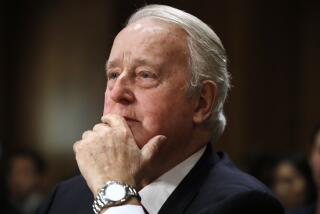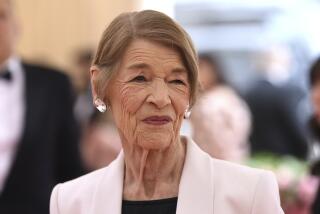James Callaghan, 92; Former British Prime Minister
- Share via
LONDON — James Callaghan, the affable, self-educated sailor’s son who rose from poverty to become prime minister in the dying years of consensus politics in postwar Britain, died Saturday on the eve of his 93rd birthday.
Callaghan died at his family home in East Sussex, south of London, 11 days after the death of Audrey, his wife of 67 years, a family spokeswoman said. The cause of the former prime minister’s death was not announced.
Callaghan, who entered Parliament as a Labor Party lawmaker in 1945, was prime minister from 1976 to 1979. He was the only British politician to hold, at different times, the posts of prime minister, chancellor of the exchequer (treasury chief), foreign secretary and home secretary.
Callaghan succeeded Harold Wilson in April 1976 and governed until May 1979, when strikes, financial crises and party divisions cost him the election against Margaret Thatcher’s Conservative Party.
“He was one of the generation who fought in the war and came back determined to build a better, fairer and different Britain in peace,” Prime Minister Tony Blair said in a statement. “In later times, I sought his counsel on many occasions and found his judgment and common sense invariably sound.”
Callaghan’s rise to become the country’s fourth Labor prime minister took stamina, unflappability and an instinct for the middle road.
Known as “Sunny Jim,” he was 64 when he inherited a quarreling party -- barely clinging to a parliamentary majority -- and an economy battered by double-digit inflation, rising wages and a plummeting pound.
Many saw him as simply a caretaker, minding the store until the Thatcherites moved in with their free-market, union-bashing doctrine.
Yet in two years, helped by the North Sea oil bonanza and $4 billion in bailout loans, the sterling recovered, inflation retreated and most workers voluntarily restrained wage demands.
As Britain returned to the black again, Callaghan approached the 1979 election running even with the Tories.
But in late 1978, the unions, fed up with wage restraints, launched their “winter of discontent.” Strikes left bodies unburied, garbage uncollected, trains paralyzed, cancer patients without medical care and children locked out of classrooms.
Callaghan stuck to his mild-mannered style. Returning from a summit in the Caribbean, he remarked, “I do not feel there is mounting chaos.”
That was not what the public wanted to hear. It wanted strong, decisive government, and the following year Thatcher ousted Callaghan with a comfortable majority.
Like Winston Churchill, Callaghan never attended college, saying he earned his degree at “the university of life.”
His central themes were aligning British interests with Washington rather than Europe and maintaining nuclear deterrence while working for arms control.
Callaghan enjoyed considerable stature abroad. President Carter and West German Chancellor Helmut Schmidt often consulted him, and former Secretary of State Henry Kissinger called him “one of the most underrated people I know. I consider him a truly wise man, a man who grows the longer you know him.”
Leonard James Callaghan was born March 27, 1912, in the southern English coastal city of Portsmouth to a Catholic father and Baptist mother.
His father died when James was 9, plunging the family into poverty. They received no pension until the Labor Party started giving them a weekly allotment of 10 shillings (then worth about $2) in 1931.
“After that we were Labor for life,” he recalled.
He dropped out of school at 16, went to work in a tax-collection office and became involved in union affairs.
After naval service in World War II, Callaghan stood for election in Cardiff and was swept in with Labor’s landslide majority in 1945. Within two years he was a junior minister.
He loyally obeyed Wilson in refusing to devalue the pound and was proved right. He acceded to Catholic appeals to send the army into Northern Ireland in 1969 to protect Catholics there against Protestant mobs, but warned them: “I can send the army in, but I’ll have the devil of a time getting it out again.” The troops are still there.
In 1980, he gave up the party leadership to Michael Foot. In 1985, he resigned from Parliament and was elevated to the House of Lords, becoming Lord Callaghan of Cardiff.
He is survived by a son and two daughters. Funeral details were not immediately available.
More to Read
Sign up for Essential California
The most important California stories and recommendations in your inbox every morning.
You may occasionally receive promotional content from the Los Angeles Times.












